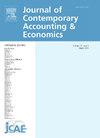Economic conditions and related party transactions in India
IF 2.9
3区 管理学
Q2 BUSINESS, FINANCE
引用次数: 0
Abstract
We investigate the impact of innovations in the level of economic activity—first-moment shocks—and its volatility, or uncertainty—second-moment shocks—on related party transactions (RPT) in India. Related parties face trade-offs between supporting the firm and extracting the private benefit, given the nature of first and second-moment shocks. Using fixed effects panel data regression for India, we find that during periods of high economic growth and low uncertainty, firms engage more in related party transactions to leverage existing relationships with affiliated entities, reduce transaction costs, and support one another. Furthermore, we find that the effect of economic growth on RPT increases after the enactment of the Indian Companies Act (2013), which mandates shareholders’ approval for material-related party transactions. We also explore the motives of RPT and find that this increase is due to business RPT and not opportunistic RPT, confirming the increase in economic activities. Apart from this, we also find that this relationship is more pronounced in manufacturing and profitable firms. We confirm our results using various robustness exercises such as alternate measures, instrumental variables, and serial correlation.
印度经济状况与关联方交易
我们研究了印度经济活动水平的创新(第一时刻冲击)及其波动性或不确定性(第二时刻冲击)对关联方交易(RPT)的影响。考虑到第一和第二时刻冲击的性质,相关各方面临着支持公司和获取私人利益之间的权衡。通过对印度的固定效应面板数据回归,我们发现,在经济高增长和低不确定性时期,企业更多地参与关联交易,以利用与关联实体的现有关系,降低交易成本,并相互支持。此外,我们发现经济增长对RPT的影响在印度公司法(2013)颁布后增加,该法案要求股东批准重大关联方交易。我们还探讨了RPT的动机,发现这种增加是由于商业RPT而不是机会性RPT,证实了经济活动的增加。除此之外,我们还发现这种关系在制造业和盈利企业中更为明显。我们确认我们的结果使用各种鲁棒性练习,如替代措施,工具变量和序列相关。
本文章由计算机程序翻译,如有差异,请以英文原文为准。
求助全文
约1分钟内获得全文
求助全文

 求助内容:
求助内容: 应助结果提醒方式:
应助结果提醒方式:


